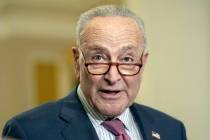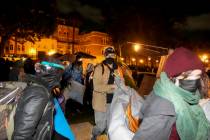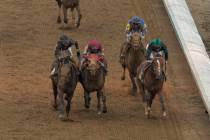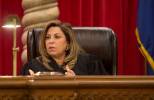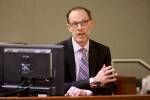Many lawyers seek appointment system
Clark County attorneys overwhelmingly support changing the Nevada Constitution so judges would be appointed instead of running for election as they do now.
The lawyers weighed in on that issue while participating in the 2010 Judicial Evaluation Survey, which rates judges on competence and other desirable judicial criteria. Of the 796 lawyers who responded, 539 (68 percent) favor the proposal.
The results were markedly different from a poll of the general public commissioned by the Las Vegas Review-Journal earlier this year. In that poll, 59 percent of respondents rejected the appointment system.
Younger attorneys tended to favor amending the constitution to change how judges are selected at a higher rate than attorneys with more than 20 years in practice, 74 percent to 67 percent. Still, the vast majority favor the change.
Nevadans in November will have two questions related to the judiciary on the ballot. Either one, if passed, would significantly alter the face of justice in the Silver State.
One addresses judicial selection. The other would create an intermediate appellate court.
Facing the issue of electing judges or appointing them, Nevada voters will participate in a growing national debate on the topic.
Proponents of the so-called merit appointment system argue the perception of corrupted elected judges threatens to undermine the judiciary.
Opponents believe putting such power in a governor -- even one handed a list of prospective jurists to choose from -- would result in cronyism and secretiveness.
Dr. Rebecca Wood, a political science professor at UNLV, said there are ups and downs to both election and appointment.
Wealthy trial attorneys are heavy contributors to judicial candidates in every state where judges are elected, and the perception such judges are compromised is toxic, she said.
But Wood also frets there is no way "the politics can be taken out" of the merit system.
U.S. Supreme Court Justice Sandra Day O'Connor is chairwoman of the O'Connor Judicial Selection Committee, a group she started in 2009 to help make judges more than "politicians in robes," according to the Institute for the Advancement of the American Legal System.
O'Connor in an interview with The New York Times in December noted the United States is the only nation that elects its judges.
Federal judges are nominated by the president and confirmed by Congress. But Nevada is one of 13 states that selects its judges in nonpartisan elections. Nine states hold partisan elections, which Wood prefers since it at least gives voters a sense of the candidates' values.
Five states, through the governor or legislature, appoint judges without a nominating committee, and 23 states appoint through a merit system upon recommendations from a nominating committee. That is the system Nevada voters will have if they approve November's ballot item.
The second issue, of establishing an intermediate appellate court, is intended to relieve strain on one of the nation's busiest state supreme courts.
The seven justices of the Nevada Supreme Court say it is past time for Nevada to establish an intermediate appeals court.
A question on the November ballot would establish a three-judge "pushdown" court, so-called because appeals will continue to go to the Supreme Court, which will then push down to the lower court those that won't set a legal precedent if affirmed or reversed.
Chief Justice Ron Parraguirre in an interview earlier this year noted the backlog of cases expands every year.
"We hear everything from death penalty cases to driver's license revocations," he said. "Nevada is all grown up. We need to do this in order to maintain our credibility."
Roughly 2,200 cases are appealed each year, about 320 per justice. By comparison, Arizona's highest court averages about 210 cases per judge per year; California, 190; and Utah, 110. Those states have intermediate appellate courts.
Among 10 other states that have no intermediate court, only West Virginia's justices receive more appeals per justice than Nevada's.
The Legislature in 2007 and again in 2009 approved sending the appellate court matter to the voters, who in the past have shot down the proposal twice -- in 1980 and again in 1992.
Nevada's population more than doubled between 1990 and 2008, from 1.2 million to 2.6 million, and caseloads throughout the state's court system have been impacted.
To address the growing caseload, the Nevada Supreme Court in 1999, two years after it expanded from five to seven justices, split into two three-justice panels to hear arguments, effectively doubling up its efforts. The entire court still hears the most important cases, however.
Justice James Hardesty acknowledged the timing is bad to establish another court, given the state's dismal financial condition, but the high court has done a couple of things to mitigate the impact.
He said more than $3 million has been returned to the state over the past couple of years to help fund the court.
Also, the intermediate court would be housed in existing courthouses, at the Supreme Court building in Carson City and at the Regional Justice Center in Las Vegas, so "brick and mortar" costs won't be a factor. The $3 million that has been socked away would cover salaries for about 18 months.
Contact Doug McMurdo at dmcmurdo@reviewjournal. com or at 702-224-5512.
The results are in from the biennial survey in which lawyers rate Clark County judges.
SUNDAY
What lawyers say about running incumbents
How we evaluate judges
Whose scores dropped
Lawyers cut slack for new judges
MONDAY
Nine should go, lawyers say
TUESDAY
Do women judges get a fair test?
WEDNESDAY
All is calm in Henderson Justice Court
THURSDAY
It's about knowing the law
TODAY
Lawyers prefer appointing judges








